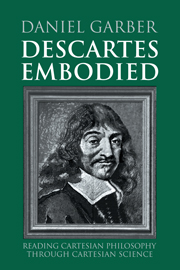Book contents
- Frontmatter
- Contents
- Acknowledgments
- Abbreviations, Citations, and Translations
- Introduction
- Part I Historiographical Preliminaries
- Part II Method, Order, and Certainty
- Part III Mind, Body, and the Laws of Nature
- 7 Mind, Body, and the Laws of Nature in Descartes and Leibniz
- 8 Understanding Interaction: What Descartes Should Have Told Elisabeth
- 9 How God Causes Motion: Descartes, Divine Sustenance, and Occasionalism
- 10 Descartes and Occasionalism
- 11 Semel in vita: The Scientific Background to Descartes' Meditations
- 12 Forms and Qualities in the Sixth Replies
- Part IV Larger Visions
- Sources
- Index
9 - How God Causes Motion: Descartes, Divine Sustenance, and Occasionalism
Published online by Cambridge University Press: 10 November 2009
- Frontmatter
- Contents
- Acknowledgments
- Abbreviations, Citations, and Translations
- Introduction
- Part I Historiographical Preliminaries
- Part II Method, Order, and Certainty
- Part III Mind, Body, and the Laws of Nature
- 7 Mind, Body, and the Laws of Nature in Descartes and Leibniz
- 8 Understanding Interaction: What Descartes Should Have Told Elisabeth
- 9 How God Causes Motion: Descartes, Divine Sustenance, and Occasionalism
- 10 Descartes and Occasionalism
- 11 Semel in vita: The Scientific Background to Descartes' Meditations
- 12 Forms and Qualities in the Sixth Replies
- Part IV Larger Visions
- Sources
- Index
Summary
In his Traité de l'esprit de l'homme (1664), Louis de La Forge, one of Descartes' early followers, wrote:
I hold that there is no creature, spiritual or corporeal, that can change [the position of a body] or that of any of its parts in the second instant of its creation if the creator does not do it himself, since it is he who had produced this part of matter in place A. For example, not only is it necessary that he continue to produce it if he wants it to continue to exist, but also, since he cannot create it everywhere, nor can he create it outside of every place, he must himself put it in place B, if he wants it there, for if he were to have put it somewhere else, there is no force capable of removing it from there.
(Traité, p. 240)De La Forge's argument is an interesting one. He begins with two premises. The first is the doctrine of divine sustenance, that God must sustain the existence of every body, indeed, of every thing, mind or body, at every moment of its existence. Second, de La Forge assumes as a result, it would seem, that God causes motion in the material world by re-creating bodies in different places at different times. From this de La Forge draws the conclusion that only God can move a body. When God sustains bodies, He must sustain them in some place or other; He cannot sustain them everywhere, nowhere, or in any way independently of some place or other.
- Type
- Chapter
- Information
- Descartes EmbodiedReading Cartesian Philosophy through Cartesian Science, pp. 189 - 202Publisher: Cambridge University PressPrint publication year: 2000



